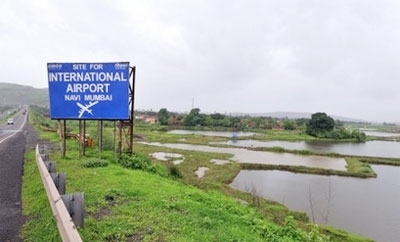India approves new airport for Mumbai
 |
| AFP - India gave the green light on Monday for the construction of a second international airport in the commercial capital Mumbai, a two billion dollar project that was ten years in the making. |
"Today, formally the environmental clearance has been given to the Navi Mumbai Project," Environment Minister Jairam Ramesh told a press conference in New Delhi.
The massive new 90 billion rupee airport will be situated in Navi Mumbai or New Mumbai, a booming suburb 50 kilometres (30 miles) southeast of the centre of the city of 18 million people.
Environmentalists had opposed the project on the grounds that it would upset the delicate ecological balance of nearby protected tidal wetland areas.
Under the initial plans, thousands of hectares of mangrove trees and shrubs, which act as a natural buffer against the sea and coastal erosion, would have been removed and waterways re-routed .
"If they want, they can start construction of the airport from today," Ramesh said. "From an environmental point of view, this has been a very major compromise that has been reached."
Ramesh said the compromise would save part of the mangroves and avoid moving one of the rivers. A hill in the area will still be flattened, however, he said.
An official in the environment ministry told AFP that the project might still face a court challenge from activists and it is also likely to run into opposition from local villagers who fear being moved without adequate compensation.
The facility is expected to handle up to 40 million passengers a year by the time it is fully operational in 2030.
Its approval marks a victory for business leaders, who have long campaigned for the new airport, the first phase of which is scheduled to open in 2012.
They had warned that investment in India's wider economy could be hit if there were further delays to an airport that would service Mumbai, the country's financial capital and home to the Bollywood film industry.
The development of major infrastructure projects in India is slow due to complicated administrative procedures, labyrinthine legal processes and strict environmental and land rights regulations.
The government has also promised to amend the existing law for the forced acquisition of land for public purposes, passed in 1994, which is seen as critical to speed up large public infrastructure projects.
Environmentalists in Mumbai termed the new airport proposal "a destructive project" and said they will continue their fight to save the mangroves.
"By giving the permission for the airport, the government has now opened the entire coastline for development projects. This will be disastrous," said Stalin Dayanand from Vanashakti (Forest Power), a non-government organisation in Mumbai.
"Mangroves protect Mumbai. We cannot remove them," he said.
Appearing at the press conference with Ramesh, Aviation Minister Praful Patel said the ministries would look into the environmental issues.
"It is our concern and joint responsibility to address issues of the environment," Patel said, adding that in reducing the damage to the ecosystem, aviation safety had not been compromised.
Passenger numbers at the existing Mumbai International Airport have increased three-fold since 2005, reflecting an overall increase in demand for air travel among the country's emerging middle classes.
The airport is nearing capacity and can not expand further as it is hemmed in on three sides by slums.
What the stars mean:
★ Poor ★ ★ Promising ★★★ Good ★★★★ Very good ★★★★★ Exceptional
Related Contents
Latest News
More News
- Foreign fruits flood Vietnamese market (December 09, 2025 | 13:22)
- Vietnam’s fruit and vegetable exports reach $7.8 billion in first 11 months (December 05, 2025 | 13:50)
- Vietnam shapes next-generation carbon market (November 26, 2025 | 15:33)
- PM urges Ho Chi Minh City to innovate and remain Vietnam’s economic locomotive (November 26, 2025 | 15:29)
- Experts chart Vietnam's digital finance path: high hopes, high stakes (November 14, 2025 | 10:56)
- Vietnam’s seafood imports surge 30 per cent in first 10 months (November 10, 2025 | 19:35)
- Vietnam’s durian exports hit $1 billion milestone (October 30, 2025 | 17:41)
- Beyond borders: Sunhouse and new era of Vietnamese brands on Amazon (October 28, 2025 | 10:46)
- Record-breaking trade fair set to open in Hanoi (October 15, 2025 | 15:59)
- Timber sector seeks solutions to VAT refunds (October 14, 2025 | 18:58)

 Tag:
Tag:




















 Mobile Version
Mobile Version